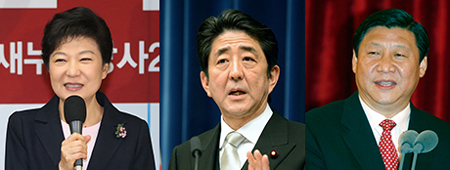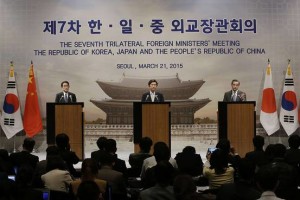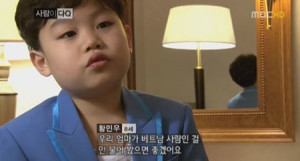Power Over Weakness: A Pipe Dream of East Asian Union


Last Saturday in Seoul, three East Asian nations’ (Korea, China, Japan) foreign ministers agreed to hold summit at ‘the earliest convenient time’, marking a thaw in relations that had been chilled by lingering disputes over wartime history and territory.[1] This may be a crucial step for the trilateral cooperation; however, for now, building a politico-economic community like the European Union deemed impossible in East Asia.
China’s unprecedented economic growth has been a leading factor of a market-driven economic integration in East Asia, and bridged three nations in terms of economic relationships.[2]For instance, “in 2003, China overtook the U.S as South Korea’s largest export destination.”[3] Despite its numerical success, true reconciliation do not seem to take place anytime soon, and it is expected that continuous tension will fluctuate the economic bridge even further. The main culprits that fuel this inflammable milieu are history debates, political nationalism and last but not least selective multiculturalism.
Recently, Wendy Sherman, who was Secretary of State for Political Affairs, contested that the prickly relations between South Korea and Japan are due to politicians having been exploiting national feelings for ‘cheap applause’.[4]
Her remark, however, is an oversimplification of ongoing tensions.
Japan has been accused of being unrepentant for its wartime deeds such as human trafficking and forced recruitment of sex slaves, namely “comfort women”. However, to assume that Japan has been parsimonious with its official apologies is also untrue.[5] Some people like Andrew Browne from the Wall Street Journal even contend that “further apologies won’t fix the real problem”.[6] Nevertheless, ‘the real problem’ lies in Japan’s inflammatory denial and distort of facts such as the sex slaves, and the Nanking massacre by minimizing the atrocities in textbooks and creating disputes over the islands it once colonized. Because of the constant denial and revoking statement, the previous apologies such as the Kono statement can be depicted as words without a heart. It may be understandable that Japan is exploiting national sentiments for its domestic ends such as garnering political supports and armament; however, this unapologetic stance will only aggravate the trilateral relations.
It is ill pressed to contemplate that the comprehensive apologies will not solve ‘the real problem’. The former German chancellor Willy Brandt’s iconic kniefall at Warsaw put an end to widespread fears that Germany would ever again threaten peace. This is what marks the difference between Germany and Japan and why Japan, despite its economic power, can never form a long-lasting political relationship, and become an economic leader in East Asia. Some notes that the political apology at this point is uneasy because of various political means, but one should retrospect that it was also tough for the former German chancellor Willy Brandt dropping his knees at Warsaw. Therefore, not only for Korea and China who are traumatized by Japanese imperialism, but also for lessening mounting tensions that menace an international peace, Japan, as Merkel recommended recently, should undertake the same road as Germany.[7]

No economic community is possible without a political leadership and a will. The debates we are assessing denounced the opposite ideological sides as ‘traitors’ and led all three nations to blur on political ideas such as progressivism. Conservative political framework may have been instrumental for each country’s domestic ends, but it has not achieved any significant resolution on an international level. A clash between Japanese Wounded Nationalism and Chinese Assertive Nationalism is a classic example of obstruction of international cooperation. The former exemplifies Japan trying to regain their “self-confidence that they lost in sustaining the economic miracle they had achieved after World War II”[8]. The latter epitomizes China displaying the rising power status after a long century of humiliation forced by foreign powers[9]. The Assertive Nationalism is well seen in the Senkaku/Diaoyu islands conflict. Consequently, the rising tide of nationalism has turned into Sino-Japanese rivalry over both political and economic issues[10], which makes it even more complicated to constitute a feasible regional cooperation. Building a community that is based solely on mutual economic consents and not on political grounds will not be just a pretentious relationship but also a hostile one that is close as an inch of real threat.
Another obstacle that oscillates the regional cooperation is an ubiquitous culture of selective multiculturalism in East Asia. It lures people because of the term, ‘multiculturalism’ but is in reality another form of racism. A myth of homogeneity such as one race, one language, and one culture prevails in East Asia. Even today, it is, at best, ambivalent about multiculturalism. Although other factors may exist, the discrimination tends to stem from subjective economic hierarchies, and generates an inhospitable atmosphere to people who are from less wealthy nations.[11] This is becoming a cancer in East Asia, and on a micro-level, regional cooperation cannot be implemented.

This may seem harsh if not drastic. In Korea, the “Little Psy” Minwoo Hwang has earned considerable popularity but this soon turned into a nightmare, as the innocent child became a target for malicious online comments just because he had a Vietnamese background.[12] Similarly, the largest ethnic minorities, known as Zainichi Koreans, has resided in Japan since the wartime period but many of the descendants “lack citizenship and voting rights, living as ‘guests’ in a nation that is the only home they know”.[13] Immigration policy in East Asia has been a gathering a dust to form a mountain. For instance, in Korea “immigration policies favor Western countries because relationships with these countries are deemed to be more valuable”[14] and “the government’s policies towards immigration are tougher towards nationals from countries like Uzbekistan, Vietnam, China or Philippines”.[15] Not only this, anti-Korean sentiment in Osaka, the second-largest metropolitan area, became a huge movement to the extent the local government is considering a ban on hate speech. Therefore, the environment of selective multiculturalism is a giant factor, resulting in an inevitable decrease in an ideological and a political mobility. Antagonizing rather than sympathizing one’s race is a serious impediment that dwindles a cooperation.
A move towards a pluralism is an inevitable movement not just to avoid drastic economic down-scaling due to the aged population specifically in Korea and Japan but to overcome a political and social stagnation. Economically speaking, the world has become an open economy and in a broader sense, it is becoming more borderless. Without Japan’s comprehensive display of contrition, political reconciliation of Sino-Japanese rivalry, and implementation of multiculturalism, the trilateral integration will be anything but a show phony. The idea of one nation with one race is obsolete and will not solve ‘the real problem’. The summit will be the first step and should demonstrate that a cooperation and a new paradigm are indeed essential and that there is no room for the old-fashioned ideas in a changing East Asia.
Works Cited
[1] Kwaak, J. (2015, March 21). Chinese, Japanese, South Korean Foreign Ministers Seek to Ease Tensions. The Wall Street Journal. Retrieved March 22, 2015, from http://www.wsj.com/articles/chinese-japanese-south-korean-foreign-ministers-seek-to-ease-tensions-1426938107
[2] Ahn, B. J. (2004). The rise of China and the future of East Asian integration.Asia-Pacific Review, 11(2), 18-35.
[3] Ibid. 2, p.21.
[4] Epstein, E. (2015, March 4). Wendy Sherman vs. South Korea. A top U.S. diplomat needlessly insults an ally. The Weekly Standard. Retrieved March 22, 2015, from http://www.weeklystandard.com/blogs/wendy-sherman-vs-south-korea_874920.html
[5] Brownye, A. (2015, January 13). For Japan, a Difficult Art of Saying It’s Sorry In East Asia of Nationalist Agendas, Further War Apologies May Do Little Good. The Wall Street Journal. Retrieved March 22, 2015, from http://www.wsj.com/articles/for-japan-a-difficult-art-of-saying-its-sorry-1421127266
[6] Ibid. 5.
[7] Visiting Merkel Reminds Japan to Face Wartime Past. (2015, March 9). Cyprus Mail. Retrieved March 24, 2015, from http://www.highbeam.com/doc/1G1-404435816.html?
[8] Ibid. 2, p.26.
[9] Ibid. 2, p.26.
[10] Ibid. 2, p.27.
[11] Ekin, A. (2014, September 11). South Korean Views on Race Linked to Economics. The Wall Street Journal. Retrieved March 23, 2015, from http://blogs.wsj.com/korearealtime/2014/09/11/south-korean-views-on-race-linked-to-economics/
[12] Kang, T. (2013, August 13). Korea’s Multicultural Growing Pains. A recent incident involving Little Psy highlights South Korea’s struggles with its growing racial diversity. The Diplomat. Retrieved March 23, 2015, from http://thediplomat.com/2013/08/koreas-multicultural-growing-pains/?allpages=yes
[13] Schubach, A. (2014, November 12). The case for a more multicultural Japan. Aljazeera America. Retrieved March 22, 2015, from http://america.aljazeera.com/opinions/2014/11/multiculturalismjapanantikoreanprotests.html
[14] Ibid. 11.
[15] Ibid. 11.
Image Sources
1.Political Atheist. (2013, February 18). New options for South Korea’s China policy. China Daily Mail. Retrieved March 23, 2015, from http://chinadailymail.com/2013/02/18/new-options-for-south-koreas-china-policy/
2.Kwaak, J. (2015, March 21). Chinese, Japanese, South Korean Foreign Ministers Seek to Ease Tensions. The Wall Street Journal. Retrieved March 22, 2015, from http://www.wsj.com/articles/chinese-japanese-south-korean-foreign-ministers-seek-to-ease-tensions-1426938107
3.Warschauer Kniefall. (2009, May 25). Retrieved March 24, 2015, from https://iconicphotos.wordpress.com/2009/05/25/warschauer-kniefall/
4.이가은. (2012, November 17). 황민우 “엄마 베트남人, 이제 한국국적” 당당고백. TV Daily. Retrieved March 24, 2015, from http://tvdaily.asiae.co.kr/read.php3?aid=1353116289419883002
